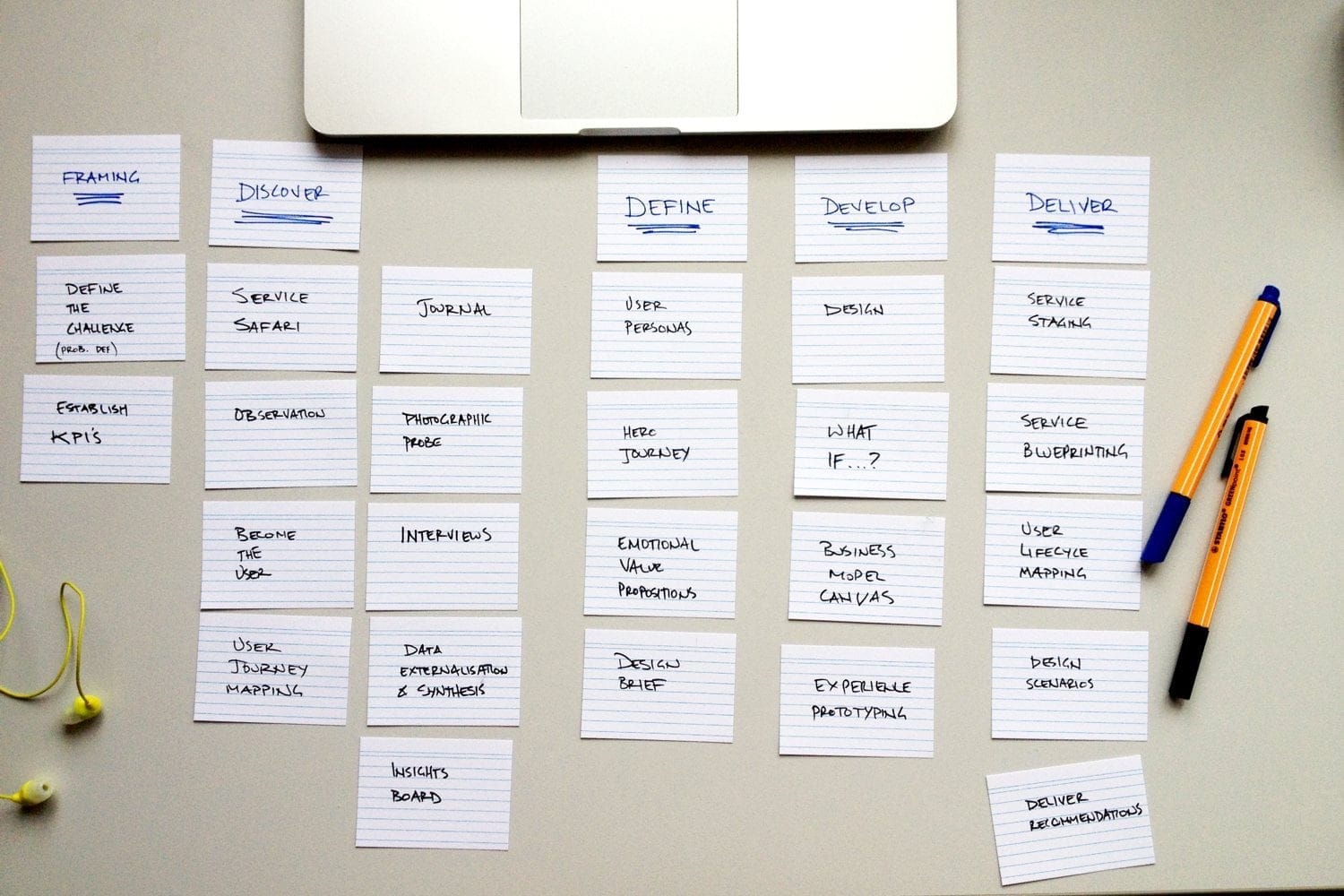Having worked for more than a decade in agencies, two things have become transparent about managing projects:
#1 - you must have a project process in place
#2 - very few of your projects will actually follow this process to the letter, the process needs to be able to flex to accommodate different needs from different clients.

This is where the project kickoff meeting comes in... not only is it the first exciting step on the project journey for both you and your client (remember, you will work on these projects every day, where as the client will only work on them once every few years), but it also gives you, the agency, the chance to explore the true scope of what needs to be achieved.
Before we get going, there’s a key point here. What has been sold can be substantially different from what needs to be done. The purpose of this post isn’t to dive into your sales process... But depending on the size of your agency the sale may have been made by a business development manager who may not have the technical knowledge necessary to define the scope of the project accurately. They have had the information to make the quote (and convert it into a sale), but there will more than likely be holes in the approach that need to be filled.
Because of this, nine times out of ten the project kickoff meeting is the first chance an agency will be willing to put proper resource to a project, and therefore have the proper talents sat around the table to figure out what needs to be achieved and how it will be done.
The Context of the Project Kickoff Meeting
Before we deep dive into the hows, whats and whys of the project kickoff meeting itself, it is important to grasp where in your project process this meeting sits. It’s a unique time of any project, and from experience is one of the few items in a project process that can have repercussions right through to delivery.
We’ve already mentioned the fact that it’s the first forum whereby members of your agency get can get their teeth into the requirements for a project, but it’s also the first meeting with a new client. You NEED to make a good impression. You NEED to look like you know what you’re doing. YOU are the guide for the meeting! And therefore YOU control the quality of the output.
In our agency, this meeting sits right after the contract has been signed and the deposit has been paid. This very fact brings a formality to proceedings. Firstly the client has paid something. Technical they’re now “in credit” with our agency and they are expecting something in return. Secondly now the agreement has been put in place, the project has moved from those who hold the purse strings, to the team who actually need to deliver the finished result. More often than not, these are different people both on the client and agency side of things. A good impression is a must. As I’ve mentioned that twice now, I hope you can see how important it is!
As a side note, the rest of this post is going to assume the kick off for a one-off, website based sale. It could be ecommerce or not, but it is not a recurring monthly project. This one-off will pass through (a version of) your project process once. There is a lot of overlap between a one off project and recurring project kickoff, but also some key differences. Our agency has taken to using an email onboarding process for recurring agreements, which means we can streamline some of the kickoff meeting, however for an adhoc project, we still prefer to do everything face to face (or at least via Skype / Zoom).
This will all take place before you have started working on the project or even invited them to your client portal.
Who needs to attend the project kickoff meeting?
I know this sounds like such a basic question, but you’d be amazed how many times I’ve sat in a kickoff meeting with the wrong people (or without the right people) in attendance!
Ideally from the client side, they need to invest the time of all the key people who will be involved in the project. That includes (for smaller businesses) the Managing Director or CEO, the heads of the departments that will have a vested interest in the output, and any key staff that will be required for the production of the website.
To make the point here, if the office junior will be populating the site for the project, bring them to the meeting!
From the agency side, it’s important to show continuity between sales, project management and production teams. Therefore, ideally you need to have in attendance the person responsible for selling the project (they will kick the meeting off), the project manager assigned to the project, the creative director or designer responsible for the project, and the technical director or developer responsible for the project. This will become the project “team” from your agency.
In smaller agencies, the project team may simply be your entire workforce and therefore you all work on everything together. In bigger agencies, I’ve seen both fixed teams (where each team always work together) and fluid teams (where each staff member can be in multiple teams at the same time). As long as your project management system can handle it, there’s no right or wrong here - it’s whatever works best for you.
Where to stage the kickoff meeting
The best kickoff meetings happen face to face. And, I hate to admit it, but they happen at the clients premises...
There’s a simple fact that by being in the client's office / factory / setting, you as the project team pick up so much more about the client and their aims and objectives than you do in your offices or over the internet. And with an emphasis on customer service (it’s a given that every agency has this emphasis these days), it shows willing and a commitment on your part.
That said, meeting in their premises isn’t always possible then either a meeting at your place, or via some online medium will suffice, you may just need to ask a few more searching questions to get to grips with what the client is trying to achieve and to get an idea of their context. These searching questions will replace that stuff that you’d pick up naturally if you were sitting with them.
What’s the purpose of the kickoff meeting?
To kick the project off, right? Well, partially right...
In all honesty, this is the first chance you’ve got to delight your client. You can already start to go the extra mile and demonstrate your true skill and the added value you can give to the client. I’m not saying you’ll up sell anything here (although you might!), but it’s the first chance of going over and above.
Let me put it this way, if the client leaves the meeting and gets in the car that night thinking “We made the right decision there. This is the right agency for us to be working with” then you’ve got it right. If they leave feeling at all underwhelmed or concerned, then you need to change your approach.
The way you delight clients is by (a) doing your homework and (b) demonstrating that you can go above and beyond the scope of their current project, just because you value them and what they do. I’m not suggesting you give away tonnes of free work, but an SEO audit here, or an Adwords report there can go miles when it comes to building lasting relationships with clients. And this meeting is step one of that lasting relationship.

At the bottom of this post you’ll find a sample agenda, and also a pre-kickoff questionnaire that we use with all of our clients. We’ve worked and modified these over time so that now we have a format that we’re happy with, and that we know gives us the platform to ask the searching questions and prove our worth and value right from the get go.
Kickoff Meeting Agenda
OK, so we’ve finally got to the big day - we’re meeting with the client! What does the meeting look like?
In overview, the agenda should be quite simple (as you will see attached) and will basically follow this format:
- Introductions - lead by Sales
- Overview of project (including key dates and aims / objectives) - lead by Sales
- Overview of process - lead by Project Management
- Design requirement - lead by Creative
- Development requirement - lead by Development
- Any Other Business
The output of the meeting should be twofold:
- A project timeline
- A specification document covering design and development requirements
Both of the above are to be approved by the client before any further work is started.
You will notice that other than the “Any Other Business” section, there is no section devoted to the client, and there’s a number of reasons for this. Primarily, this is not a presentation. It’s a meeting. And therefore each section is there to drive a discussion. Secondly, you’re the expert. It’s you job to ensure the client is guided through the process from start to finish and all the appropriate information and documentation is discussed. If anything is missed, the buck stops with you.
To give a bit more information here o;each of the items above:
Introductions - lead by Sales
At the start of this process, it’s likely that the only person that knows everyone around the table will be the Business Development Manager (BDM), or the person responsible for the Sale. To make everyone feel more at home, the key introductions should happen around the table, and the BDM should take the lead in facilitating this.
Overview of project (including key dates and aims / objectives) - lead by Sales
Referring to a point above, it’s really important that you as an agency look like you know what you’re doing. By having the BDM lead a project overview, it gives that confidence to the client that the brief has been understood and the quoting process has been appropriate for their project.
In addition to running through the project, this part of the meeting enables the whole team to discuss the bigger picture priorities for the client. What are their business goals? How are they going to achieve them? Where does this project fit into that picture, and can you add any value to make the bigger goals more realistic or easier to achieve? For everyone in the agency that’s had an internal chat and gone through the project questionnaire, this should be an easy part of the meeting to go through.
Overview of process - lead by Project Management
Originally we always used to do this section last, however it always seemed to get rushed, and it’s actually vitally important that the whole client team understands this, therefore we bumped it up the order...
The point here is that for the first time, the Project Manager (PM) will get to take a lead on the project, and that starts right now. We e actually had the BDM leave the meeting at this point as their part is done - the project has been successfully handed over to production. The PM can facilitate the rest of the agenda - after all they’ll be facilitating the rest of the project!
Within this section, you’ll be on boarding the client to your process. You can discuss their key dates, but more importantly inform them of you you will require from them to complete the project!and by when. And if something isn’t received on time, what the repercussions can be to the overall timescale.
Need your content by a certain date? There’s a service for that... 😉
Design requirement - lead by Creative
OK, so now we get to the fun bit. The Creative Director gets to do what they do best - get creative!!
Although this is a design requirement, looking for the modules, assets, colour palette, brand guidelines, etc there’s nothing stopping any of the team chipping in with queries regarding user journey, how things will work etc, as long as the design team get to cover their stuff.
Remember there’s going to be a design section to the specification created after the meeting, so it’s imperative that the Creative Director or Designer present has everything they need to complete that piece of work.
Whilst this isn’t the forum to start showing initial design concepts, if there is anything you have pre-prepared to get any feedback on, it can show some great willing. Also discussing a client's dislikes, is just as important as their likes when it comes to this. You don’t want to present something purple if they can’t stand the colour!
On a more serious note, if there are any bespoke pieces of functionality, modules or custom interfaces, now is the time for both design and development personnel to jump in and get the client invigorated that this is going to be great!
Development requirement - lead by Development
So here we go, we’re coming in to land... it’s been a whirlwind journey, but we’re nearly there and by now your client should be enthralled that what they’re going to receive will be great.
When it comes to development, there’s a lot of data here that can be standardised. Do you have domain host details? Who is providing the hosting? Are there any back office integrations? Have you thought about streamlining some of your processes? Do you have a payment gateway? If so, what is it? Is there anything out of the ordinary that we’ve not already covered?
If it’s an ecommerce site, there there may be other questions to do with inventory management, stock, discounts, etc... you get the idea - how will stuff work.
Again, the developer will have a technical section of the specification to write, so it’s important they leave with all the information necessary.
Any Other Business
By this point your client is probably a little tired and starting to lose focus. You’ve covered a lot and frankly everyone around the table will deserve a beer.
This is one last chance for anything that hasn’t been covered. If the meeting has been prepped properly, then really there should be Any Other Business, but you never know...
And that’s it - you’re done! The PM can close the meeting with a date to for the timeline and report and everyone can get in with their day. Good job team!
As mentioned above, you can find the sample agenda and pre meeting questionnaire here.
Agenda: Link
Questionnaire: Link
This post was written by Pete Everitt, owner of so-theagency.com.



